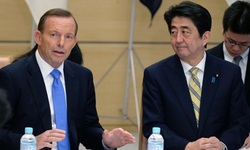 Source: Reuters
Source: Reuters This is certainly an historic deal, not least of which because it demonstrates that PM Abe was prepared to overrule more vested interests in Japan’s agricultural sector in order to promote his vision of a Japan that more actively contributes to regional growth (on this point, Aurelia George Mulgan had a particularly insightful blog post for the East Asia Forum, outlining the challenges for Abe in dealing with the agricultural sector and arguing that Abe still had a long way to go to generate confidence in his structural reform program).
While the degree of tariff reductions will generate criticism in Australia that they are nowhere near adequate (a reduction from 38.5% on beef to 23.5% over 15 years), they are the first cracks in the monopoly on prices and market access that Japanese small-scale producers have enjoyed for decades. For PM Abe to take this step also indicates that he is prepared to further Japan’s participation in the TPP, although like other countries Japan will not acquiesce to (primarily US) demands to place ISDS (Investor State Dispute Settlement) clauses within a joint document (this point was reiterated in the EPA with Australia, as no ISDS clause exists to allow companies to sue governments to the point of bankruptcy).
The other matter to come out of Abbott’s visit to Tokyo was the agreement to begin a dialogue ($) on technology and weapons development between Australia and Japan. This process has been underway since 2012, when Japan first stated that it would relax the restrictions on arms exports as part of the ‘normalisation’ process for its defence forces. The announcement has been a long time in coming, and Australia has been prodding Japan for information about its Soryu-class submarine engines and generators since the former Labor government was in power. With Australian Defence Minister David Johnston poised to deliver a speech on Wednesday ($) this week indicating that the Abbott government will reduce the number of future submarines from 12 to (most likely) 9, there is every chance that Japan will become a major contributor to the development of Australia’s future submarine fleet. As Senator Johnston will also indicate that the government may seek a proven submarine design from abroad rather than a totally new design created in Australia, this could become a litmus test for the future of bilateral defence technological development between Australia and Japan (although unions in Australia are already sounding warning bells, convinced that the Abbott government might try to sell them out in exchange for overseas shipbuilding expertise).
Of course, PM Abbott’s trip does not end in Tokyo, and already he has already made his way to Seoul to begin talks with President Park Guen-hye for the signing of an FTA between South Korea and Australia. It is just possible that South Korean defence industries will want to query Abbott about Australia’s defence needs, particularly following criticism of Australia’s sudden decision ($) to scrap the purchase of K9 self-propelled howitzers in 2012, a project that the former South Korean government of Lee Myung-bak took close interest in and hoped would serve as a lynchpin for future Australian purchases of Korean defence equipment. Although the South Korean plan was abandoned by the Labor government, given Australia’s history of bailing on projects with South Korea, the Park government may indeed seek a more formal level of agreement between both countries to promote their security ties.
The real challenge of the tour, of course, will be China, and there has been no shortage of speculation on the reception PM Abbott will receive in Beijing. From recognition of Australia’s place as an ally of the US to dismissal of Australia as anything other than a bit player in regional politics, the impetus will be on PM Abbott to establish some sort of relationship with the Chinese leadership, even if this proves to be little more than an agreement on trade negotiations and private talks with President Xi Jinping. China will be particularly interested to know about Abbott’s time spent observing Japan’s National Security Council, given that he was the first foreign leader to witness its proceedings, and considering that China has considered any such institution evidence that Japanese ‘militarism’ is again on the march, China will be looking to see whether Abbott’s rhetoric on ‘keeping old friends while seeking new ones’ actually reflects Abbott’s intentions or is little more than window dressing for a wider plan to inhibit Chinese influence in the region.
 RSS Feed
RSS Feed